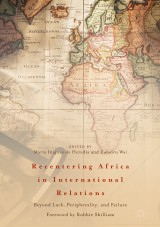Details

Recentering Africa in International Relations
Beyond Lack, Peripherality, and Failure|
181,89 € |
|
| Verlag: | Palgrave Macmillan |
| Format: | |
| Veröffentl.: | 22.02.2018 |
| ISBN/EAN: | 9783319675107 |
| Sprache: | englisch |
Dieses eBook enthält ein Wasserzeichen.
Beschreibungen
<div>This innovative book responds to an existing demand for taking Africa out of a place of exception and marginality, and placing it at the center of international relations and world politics. Bringing together a number of scholars from various disciplinary backgrounds to stage a critical intervention into the problematic ways Africa is accounted for in the dominant discourses of international relations and global politics, it challenges the structural and epistemic biases of IR that render the contributions of the continent invisible, and situates the continent as a global region that exists beyond notions of lack, disorder, and failure. Through these interventions, the volume contributes to a rethinking of IR, and the conditions of possibility for imagining a world otherwise beyond frames that fetishize Africa paradoxically as transparent and invisible. </div>
<div><div>1. Africa in/and International Relations: An Introduction</div><div><i>Zubairu Wai</i></div><div><br></div><div>2. International Relations and the Discourse of State Failure in Africa</div><div><i>Zubairu Wai </i></div><div><br></div><div>3. Re-engaging History and Global Politics in the Accounts of the Contemporary Conflicts in the DRC</div><div><i>Marta Iñiguez de Heredia</i></div><div><br></div><div>4. Images of Africa in World Press Photo</div><div><i>Kate Manzo</i></div><div><br></div><div>5. Rehistoricizing the Sovereignty Principle: Stature, Decline, and Anxieties about a Foundational Norm</div><div><i>Amy Niang</i></div><div><br></div><div>6. Archiving Trauma and Amnesia: The Racialized Political Theologies of Reconciliation in South Africa</div><div><i>Zahir Kolia </i></div><div><br></div><div>7. Alternatives to Development in Africa</div><div><i>Sally Matthews</i></div><div><br></div><div>8. African Anti-Colonialism in International Relations: Against the Time of Forgetting</div><i>Branwen Gruffydd Jones</i></div><div><br></div><div>9. A Decolonial World-Ecological Reading of the Global Land Grab: Gambella, the River and the Fall of Karuturi</div><div><i>Bikrum Gill </i></div><div><br></div><div>10. Bringing African Scholarship Back In: Lessons from the Pan-African Political Project</div><div><i>Gemma K. Bird</i></div><div><br></div><div>11. Against Bringing Africa ‘Back-In’</div><div><i>Sabelo J. Ndlovu-Gatsheni</i></div><div><br></div><div>12. Conclusion: Reappraising Africa’s Place in International Relations </div><div><i>Marta Iñiguez de Heredia </i></div>
<div><b>Marta Iñiguez de Heredia </b>is Marie-Sklodowska Curie Fellow at the Institut Barcelona d’Estudis Internacionals, Pompeu Fabra University, Spain.<br></div><div><br></div><div><b></b><b>Zubairu Wai</b> is Associate Professor of Political Science at Lakehead University, Canada.<br></div>
This innovative book responds to an existing demand for taking Africa out of a place of exception and marginality, and placing it at the center of international relations and world politics. Bringing together a number of scholars from various disciplinary backgrounds to stage a critical intervention into the problematic ways Africa is accounted for in the dominant discourses of international relations and global politics, it challenges the structural and epistemic biases of IR that render the contributions of the continent invisible, and situates the continent as a global region that exists beyond notions of lack, disorder, and failure. Through these interventions, the volume contributes to a rethinking of IR, and the conditions of possibility for imagining a world otherwise beyond frames that fetishize Africa paradoxically as transparent and invisible. <div><br></div><div><div><b>Marta Iñiguez de Heredia </b>is Marie-Sklodowska Curie Fellow at the Institut Barcelona d’Estudis Internacionals, Pompeu Fabra University, Spain.<br></div><div><br></div><div><b></b><b>Zubairu Wai</b> is Associate Professor of Political Science at Lakehead University, Canada.</div></div>
<p>Challenges the dominant and hegemonic notion that Africa is peripheral, exceptionally outside world politics, and marginal</p><p>Offers a theoretically and empirically rich analysis by bringing together a number of scholars from various locations and disciplinary backgrounds</p><p>Constitutes an elegant epistemological critique of IR and how it relates to Africa, painting a complex picture of the dynamics of world politics, the larger structures within which it is produced, and Africa’s place in it</p>
<div>Challenges the dominant and hegemonic notion that Africa is peripheral, exceptionally outside world politics, and marginal</div><div><br></div><div>Offers a theoretically and empirically rich analysis by bringing together a number of scholars from various locations and disciplinary backgrounds</div><div><br></div><div><div>Constitutes an elegant epistemological critique of IR and how it relates to Africa, painting a complex picture of the dynamics of world politics, the larger structures within which it is produced, and Africa’s place in it</div></div>
Diese Produkte könnten Sie auch interessieren:

Inclusión educativa de niños, niñas y adolescentes migrantes venezolanos, en Colombia

von: Douglas Jiménez

15,99 €
















